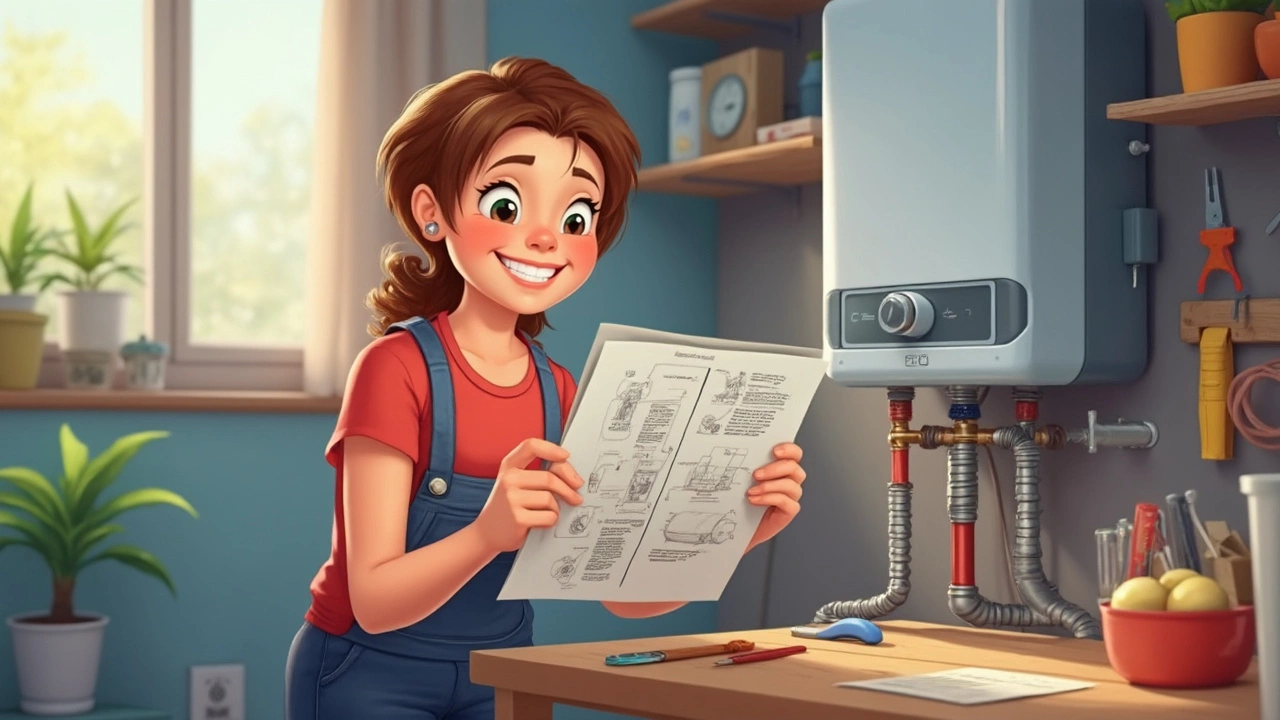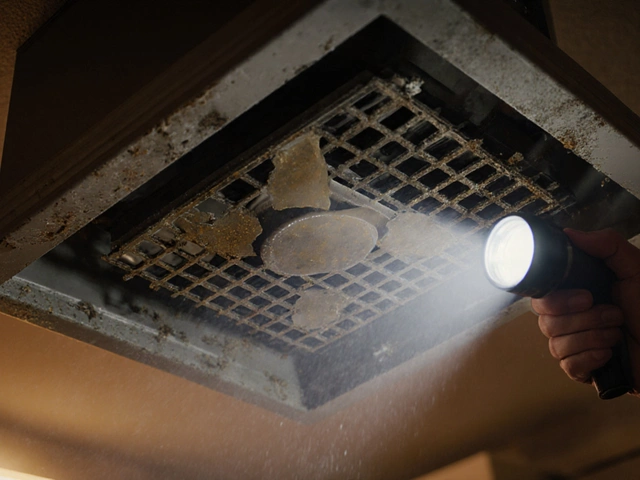If your hot water's suddenly ice-cold, you’re probably wondering how long you’ll be stuck boiling water on the stove—or if you’ll be lucky enough to squeeze in a hot shower before work tomorrow. Here’s the good news: a hot water heater replacement usually doesn’t take all day. For most homes, you can have a new tank humming away in just a few hours—not a whole weekend.
The speed depends on a handful of things like the type of heater, how old your current setup is, and whether you’re going pro or rolling up your sleeves for a DIY session. Most pros can swap out a basic tank heater in two to four hours. Tack on a little more if you’ve got weird plumbing quirks, live in an older home, or are switching between electric and gas.
Don’t want to wait forever? The best move is to have all the parts and tools lined up before the install starts. As simple as that sounds, even experienced plumbers get snagged by broken shutoff valves or stubborn old tanks that won’t budge (trust me—I once spent two extra hours wrestling a rusty unit out of a neighbor’s basement). Want it even smoother? Snap a photo of your current setup and show it to your plumber or hardware store. They’ll spot what’s needed before the install, saving major hassle—and maybe rescuing your evening from cold noodle dinners and frantic towel baths.
- What Impacts Water Heater Replacement Time?
- Typical Timelines: Gas vs. Electric Heaters
- DIY vs. Professional: What’s Faster?
- Avoiding Delays: Common Surprises
- Quick Tips for a Smooth Swap
- When to Replace Over Repair
What Impacts Water Heater Replacement Time?
A bunch of things can speed up or bog down your hot water heater replacement. It’s way more than just swapping out the old tank for a shiny new one. Let’s dive into the main factors, so you know what to expect and can plan your day.
- Hot water heater type: Replacing a basic electric unit usually takes less time than a gas one. Gas heaters need extra steps—like hooking up gas lines and testing for leaks. Tankless upgrades can take all day, especially if the mount or venting needs changing.
- Accessibility: If your heater’s tucked away in a cramped attic or a crawl space, double your estimate. Open basements or garages? Lucky you, that’s usually quick work.
- Plumbing and electrical updates: Sometimes, the pipes or wiring need new parts to fit the new unit. Upgrading gas lines or adding shutoff valves will add hours. If the old supply lines are corroded or leaking, just getting them off can be a beast.
- Permit and inspection requirements: In many places, swapping a gas water heater means pulling a permit and getting an inspection after. This can stretch out the total time, even if the hands-on work is quick.
- Draining and cleanup: Heaters have to be totally drained before removal. If your tank’s packed with sediment, prepare to wait—the gunk slows things way down.
- Who’s doing the job: Pros are fast, but even they hit snags. If you’re doing it yourself, expect everything to take longer, especially if you’re not handy with plumbing tools.
Wondering how these factors stack up? Here’s a quick look at average times for different situations:
| Situation | Average Time (Hours) |
|---|---|
| Electric tank heater, easy access | 2–3 |
| Gas tank heater, easy access | 3–4 |
| Tankless water heater upgrade | 6–8 |
| Old, corroded plumbing | +1–2 extra |
| Tight/crawl space install | +1–2 extra |
A little prep goes a long way. Clearing space around your heater, making sure the path from your driveway isn’t blocked, and knowing if you need permits can knock off plenty of stress—and might even speed things up. If you’re not sure about anything, snap a few photos and show them to your plumber or the sales team. Saves both of you a few headaches.
Typical Timelines: Gas vs. Electric Heaters
When you’re looking at a hot water heater replacement, the big question is always: how much of my day is this going to eat up? The answer depends a lot on the type you’ve got—gas or electric.
For gas water heaters, most plumbers finish the job in about three to four hours. Here's why: gas heaters need to be hooked up to both plumbing and gas lines. After disconnecting the old tank, the plumber has to safely shut off the gas, detach the line, and test for leaks once the new one goes in. Venting also needs attention, since carbon monoxide is nothing to mess with. If your house has tight crawl spaces or old valves that don’t budge, expect things to run a little over four hours.
Electric water heaters are usually a faster swap. They don’t need venting or gas hookups, so technicians often wrap up in two to three hours. Turn off the circuit breaker, disconnect wiring, swap tanks, reconnect, and flip the breaker back on. It’s that straightforward unless you run into fussy wiring or need an upgrade to your electrical panel.
- Quickest change: Like-for-like replacements where plumbing and wiring/gas stay the same go lightning fast.
- Add 30-60 minutes: If you’re switching between gas and electric, expect extra time for new hookups (plus permits in some cities).
- Heater size matters: Larger tanks or those squeezed into a closet or attic always take longer to wrestle out and install.
One last thing—once your new tank is in, it still needs time to heat up. An electric heater can take about an hour to get hot water flowing. Gas? Usually half that. So plan your post-install shower accordingly.
DIY vs. Professional: What’s Faster?
A lot of folks want to save money by replacing a water heater themselves. The thing is, speed is rarely on the side of the first-time DIYer. Even if you’re pretty handy, swapping a hot water heater brings some curveballs—think heavy lifting, tight spaces, and more parts than you expect. For most homeowners doing it for the first time, plan on 6–8 hours if everything goes well. And that’s just the physical job—not trips to the hardware store for that missing drain valve or fitting the new heater into a spot designed in the disco era.
Professional plumbers, on the other hand, do this day in, day out. Most can yank out the old tank, haul in the new one, hook things up, test for leaks, and haul away the old unit in about 2–4 hours. That includes some cushion for the weird stuff—like corroded pipes, old shutoffs that need replacing, or stubborn tanks that won’t budge. They also already have the tools—and if something goes wrong, they’re insured. You’re not.
- Safety: Gas water heaters especially have high-risk hookup. Gas leaks are dangerous; messing up venting can be deadly. Don’t risk it unless you really know what you’re doing.
- Permits and Codes: Local codes often require a permit and inspection for hot water heater replacement. Plumbers handle this so you don’t get fined or have insurance trouble down the road.
- Time vs. Cost: You’ll save on labor by going DIY, but you may wind up spending more if you have to redo work or hire a pro when something goes sideways.
Just to put it in perspective, here’s a breakdown of average times for each route:
| Replacement Type | Average Time (Hours) |
|---|---|
| DIY (First-Timer) | 6–8 |
| DIY (Experienced) | 4–6 |
| Pro Plumber | 2–4 |
If time is the top priority—maybe you’re trying to avoid another round of freezing showers—calling a pro makes the most sense. If you’ve got the whole day and don’t mind learning on the fly (or calling your cousin for backup), DIY can work, but you’ll want to keep your favorite plumber on speed dial just in case.

Avoiding Delays: Common Surprises
Hot water heater swaps rarely go exactly as planned, even if you prep like a champ. There are a few usual suspects that throw wrenches (sometimes literally) into the process. Knowing what can trip you up saves time—and a whole lot of frustration.
One of the biggest headaches is discovering that old plumbing doesn’t match up to new fittings. If your house was built before 1990, you might face outdated pipe sizes or even galvanized lines that need replacing. This can add an hour or more to your install, and sometimes turns a quick job into an all-day affair. That’s why most pros bring extra adapters and flexible hoses—so consider picking those up if you’re doing it yourself.
Another common delay? Water shutoff valves that just won’t close. Or worse, valves that snap off when you try. It sounds minor until you’re mopping up a small flood. Seriously, check your shutoff valve before anyone disconnects anything. If it feels stuck or crusty, add a replacement to your shopping list.
Hauling out the old tank can get ugly too. Drained tanks can still hold gallons of water and weigh well over 100 pounds. Basements with tight stairwells turn this into a wrestling match. Some folks end up cutting the old tank in half (not kidding) just to haul it out.
Here’s a quick look at some common replacement curveballs and the average time each can add:
| Surprise Problem | Average Extra Time |
|---|---|
| Old, corroded pipes/parts | +45-90 minutes |
| Broken or stuck shutoff valve | +30-60 minutes |
| Hauling tank from tight space | +30-90 minutes |
| Upgrading venting for code | +60 minutes |
| Switching from gas to electric (or vice versa) | +2-3 hours |
The best way to avoid hot water heater replacement headaches is to do a quick inspection first. Bring a flashlight, check the pipes, peek at the shutoff, clear a path for the tank, and measure twice. It’s not overkill—it’s a timesaver. If you’re hiring help, snap lots of photos and text them over. That way your plumber shows up ready to work, not just ready to make a supply run.
- Inspect all valves and connections ahead of time—don’t wait until the job starts.
- Buy extra connectors and flexible hoses to match old/new pipe sizes.
- Clear out clutter near the heater for easy tank removal.
- Double-check what local code requires for venting and electrical connections.
Prep saves headaches, but knowing what to expect makes the day way less stressful.
Quick Tips for a Smooth Swap
Want to make your hot water heater replacement a breeze? A few smart moves upfront can save a ton of time and hassle. Plumbers actually say that half the hold-ups they see could’ve been stopped if folks just prepped better. Here’s how to avoid trouble:
- Check the size twice. Make sure your new water heater will fit through doorways and in the space left by the old one. Grab a measuring tape and double-check. Tanks—even just a couple inches too wide—can be a nightmare.
- Shut off power and water before you touch anything. For electric heaters, flip the breaker. For gas, turn off the valve. Both? Shut down both. Missing this step is the fastest route to costly (and dangerous) mistakes.
- Drain the old tank fully. Connect a hose to the drain valve, open it up, and let it empty out—preferably outside or into a basement drain. A tank half full of hot sludge is no fun to move.
- Snap photos of your setup. Take clear pics of plumbing, hookups, and wiring before you unhook anything. Even pros use this hack—trust me, it makes reconnecting everything so much easier.
- Pick up connectors and tape in advance. Problems pop up most often because of missing connectors or the wrong sizes. Grab plumber’s tape, new fittings, and flex hoses if needed. Having them ready will keep things moving.
Wondering how the pros keep things moving? Here’s what usually adds (or subtracts) from your install time:
| Factor | Time Impact |
|---|---|
| Already have shutoff valves in good shape | -30 min |
| Switching from gas to electric (or vice versa) | +1-2 hours |
| Upgrading to a bigger tank | +30-45 min |
| Old tank stuck or rusted in place | +1 hour |
| Parts/tools not on hand | +45 min |
If your home’s older or your last water heater was installed decades ago, expect a few extra surprises—rusted pipes, seized valves, or weird venting setups. If you spot anything sketchy (like corrosion or leaky piping), tell your installer before work starts. You’ll avoid the mid-job panic run to the hardware store.
Finally, keep kids and pets out of the work zone. I learned this the hard way when my daughter Piper started “helping” and nearly rolled a fitting under the fridge. Trust me, Paw Patrol can babysit for an hour while you stay focused on the swap.
When to Replace Over Repair
Everybody wants to save a buck, but sometimes patching up an old hot water heater just isn't worth it. Before you throw money at another repair, check out these facts and tips so you know when it’s time to pull the plug and swap the whole thing.
First, consider your heater's age. Standard water heaters last around 8–12 years if you’re lucky. If your unit is pushing the double digits, every repair is basically a gamble. Here’s a quick look at typical lifespans and replacement windows:
| Heater Type | Average Lifespan (years) | Time to Consider Replacement |
|---|---|---|
| Tank (Gas) | 8–12 | 8+ |
| Tank (Electric) | 10–15 | 10+ |
| Tankless | 20+ | 15–20 |
Here are the classic signs it’s better to replace your hot water heater:
- Leaking tank: If water’s pooling at the base, that tank’s on its way out. Repairs rarely fix a cracked tank for long.
- Rusty water or rumbling noises: Corrosion and sediment build-up both signal the end is near.
- Temperature swings: If you can’t get steady hot water even after fixing thermostats or elements, the heater’s wearing out.
- Sky-high energy bills: An old heater works overtime to do the same job, burning way more power or gas.
- Multiple repairs in one year: If you’re calling the plumber more than once or twice, it’s cheaper long-term to get a new unit.
Still on the fence? Here’s a rule-of-thumb: if repairs cost 50% or more of a new water heater, just replace it. And remember, newer models can save around 20% in energy because of improved efficiency standards set in 2015.
My daughter Piper once asked why I didn’t just "fix the old tank again" instead of getting a new one. I told her: "Eventually, you stop buying patches and just get a new bike." Same deal here.





